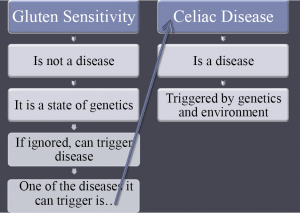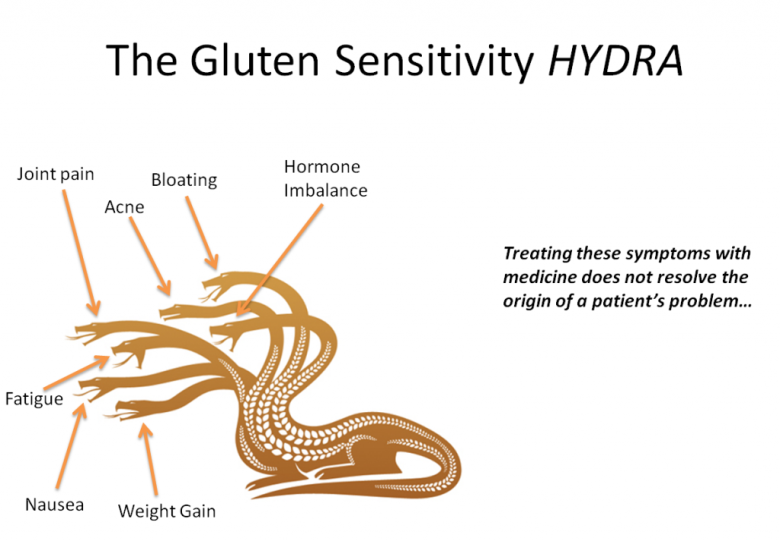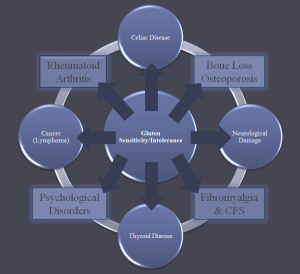Diseases That Can Be Associated By Eating Gluten
Gluten sensitivity and other diseases can be related to having some reaction to any form of gluten in the diet. Gluten is a protein that is found in all grains. Some individuals may experience sensitivity to one grain such as corn, while others may not.
The purpose of this article is to enlighten those that have gluten sensitivity to be made aware of what other diseases or medical conditions they could be experiencing or contacting because of eating any form of gluten in their diet.
It has been noted by the National Foundation of Celiac Awareness estimates “that over 18 million Americans have gluten sensitivity” and many may not even know that they have it.
While most doctors will prescribe some form of drug to help with the gluten symptoms, these drugs do not treat the actual cause of the disease, which can only be found through certain specific tests. In most cases, the patient does not experience any help or improvement of their condition from the drugs and in some cases; develop other diseases because of taking these drugs or medications.
The following topics will be available for further reading. Just click on the topic of interest and you will be taken directly to that section. Or, you can scroll down to read them all.
- Common Examples of Gluten Related Conditions
- Other Related Gluten Diseases or Symptoms
- Gluten Sensitivity
- Other Medical Conditions When Consuming Gluten
- Final Thoughts
- Conclusion
Common Examples of Gluten Related Conditions
Below are some of the most common gluten related conditions and you should be aware of:
- Schizophrenia
- Nerve Damage
- Migraine Headaches
- Thyroid Disease
- Muscle and Joint Pain
- Epilepsy
- Diarrhea
There is a difference between gluten sensitivity and celiac disease. Check out this statement: “everyone with celiac disease is gluten sensitive, but not everyone with gluten sensitivity will develop celiac disease”. See the definitions below that has been provided by “The University of Chicago Celiac Disease Center“.
- Celiac disease – Is an inherited autoimmune disorder that affects the digestive process of the small intestine.
- Gluten sensitivity or gluten intolerance (GI) – Causes the body to mount a stress response (often GI symptoms) different from the immunological response that occurs in those that have celiac disease (which most often causes intestinal tissue damage).
- Wheat allergies – A wheat allergy causes the immune system to attack or respond to a food protein because it considers it dangerous to the body when it isn’t. This immune response is often time-limited and does not cause lasting harm to the body tissues.
If left untreated, both the wheat allergies and gluten intolerance can lead to celiac disease. Therefore, it is imperative that the individual removes all gluten from their diet. This is the only cure that one can do to get them to better health. Failure to get off gluten can result in other related medical diseases.
Gluten Sensitivity and Other Diseases topics.
Go Back To Top of Page
Other Related Gluten Diseases or Symptoms
Below are some additional gluten related diseases that you should be aware of because of ingesting gluten in your diet:
- Joint Pain
- Migraine Headaches
- Skin diseases
- Seizures
- Nerve pain and neuropathy
- Irritable Bowel Syndrome (IBS)
- Hormone Disruption
- Autoimmune Disease
- Digestive Problems
- Celiac Disease
- Bone Loss Osteoporosis
- Neurological Damage
- Fibromyalgia & CFS
- Thyroid Disease
- Physical Disorders
- Cancer (Lymphoma)
- Rheumatoid Arthritis
Gluten Sensitivity and Other Diseases topics.
Go Back To Top of Page
Gluten Sensitivity
What is gluten sensitivity? This is a good question and deserves an answer. Take a look at the picture above.
Below is a quote from Dr. Peter Osborne from the GlutenFreeSociety.org.
“Gluten sensitivity manifests in hundreds of different ways. It has been called a multi headed HYDRA of disease. Each head in the picture represents a different symptom or disease“. (For those of you who don’t know what a Hydra is – look at the picture above) Drugs are typically used to treat the symptoms of gluten induced disease, but unfortunately, they do not correct the core of the problem.
So, for every symptom a medication is used to treat, several new symptoms arise (A Hydra will sprout two new heads for every head lost). Thus a person goes undiagnosed for years because doctors are chasing symptoms instead of addressing their root cause.
Because research has shown that as many as 40% of all Americans may be gluten sensitive, and that 1 in 100 have a severe form of this sensitivity causing the autoimmune intestinal disease, celiac sprue, a case can be made that everyone in America should be screened for gluten sensitivity.” The quote is taken directly from Dr. Peter Osborne of the Gluten-Free Society.
Gluten sensitivity is…
- Not a disease
- It is a state of genetics
- If ignored, can trigger disease
- One of the diseases it can trigger is Celiac Disease
Currently, the only known cure of gluten sensitivity is a gluten-free diet. Usually some patients experience some healing or removal of diseases that doctors have been treating with drugs. As you can see from above, some of the effects that gluten has on the body, and of course, the symptoms being experienced will vary from person to person.
Getting the individual off gluten begins the process of their body healing and ingesting the nutrients of the foods they intake. Over time, this process will heal their body of many of these symptoms. Of course, it may not do all of them, however, a vast majority of patients do experience going off some if not all of the drugs that doctors have prescribed for them to take. Remember, taking the drugs for a disease is only trying to bandage the cause. We know the cause and it’s the gluten that’s being ingested in the diet. Remove gluten from the diet, and the patient should see a vast improvement of their health and condition.
Gluten Sensitivity and Other Diseases topics.
Go Back To Top of Page
Other Medical Conditions When Consuming Gluten
Take a look at the image on the right. It shows some medical conditions persons can have just by eating gluten.
Below are some additional medical conditions that individuals can receive when consuming gluten in their diet. Many of these conditions can be hidden through the mask of taking drugs for a prior health issue.
- Leaky Gut
- Iron Deficiency Anemia
- Vitamin B12 Deficiency
- Excessive gluten consumption can cause excessive weight gain or loss
- Asthma symptoms
- Testosterone Problems in Men
- Liver Damage
- IBS
- Gluten can cause your gallbladder to malfunction
If you are gluten sensitive, it should be noted that there is some hidden gluten in cosmetic and skin products that can cause some health related problems. Be sure when you purchase any type of skin or cosmetic that you check with the manufacture first to be sure that there is no hidden gluten during the processing of the product.
Another area of concern is if you are a vegan, getting sufficient amounts of B12 comes only through eating animal products, meat, poultry, fish, eggs and milk products. You will need to ensure they get their daily requirement of B12 through supplements.
Gluten Sensitivity and Other Diseases topics.
Go Back To Top of Page
Common Signs of Gluten Intolerance
Below are some signs of gluten intolerance. If you should experience any of them, you just might have gluten intolerance and should stop eating gluten. The signs of gluten intolerance are:
- Bloating
- Diarrhea, Constipation and Smelly Feces
- Abdominal Pain
- Headaches
- Feeling Tired
- Skin Problems
- Depression
- Unexplained Weight Loss
- Iron-Deficiency Anemia
- Anxiety
- Autoimmune Disorders
- Joint and Muscle Pain
- Leg or Arm Numbness
- Brain Fog
The above symptoms are just possible causes of gluten intolerance. Gluten intolerance can have numerous symptoms as listed above. The important take away from this is if you are suffering from any of the above, try eliminating gluten from your diet.
Final Thoughts
A gluten free diet is not dangerous even if you do not have gluten sensitivity. If you have been diagnosed with gluten sensitivity you should try to stay away from digesting the “processed” gluten free foods. The reason is they are low in nutrition and high in calories and carbs. A gluten free diet should consist of ingesting foods that contain sufficient nutrition including vitamins, minerals, and fiber on a daily basis.
“As many as 92% of the people following a gluten free diet continue to have health problems because of cross contamination, processed food, and consumption of corn, rice, sorghum and other grains.” Source: Aliment Pharmacol Ther. 2009 Jun 15;29(12):1299-308. Epub 2009 Mar 3.
As you can see, gluten is a major cause some major health issues if the symptoms are not fully taken care of. Taking medications may not help anyone especially if they are gluten sensitive. Be sure to get valid tests done to ensure your sibling, son, daughter, or relative has been diagnosed with the gluten sensitivity or celiac disease. Always treat the cause and not the symptom as other health related problems can flame up just by consuming gluten in the diet on a regular basis.
Gluten Sensitivity and Other Diseases topics.
Go Back To Top of Page
Conclusion
I think you can agree, that once you have been diagnosed with gluten sensitivity you should completely remove all types of gluten grains from your diet. Remember, all grains have some form of gluten proteins in them at various levels. However, not all sensitive individuals may experience a reaction to them. It is always best to be on the safe side and just skip them altogether.
It is possible that you could have some cross-reactors and side effects that also can cause your immune system to flare up as well. Click on the link to read about which cross-reactors to avoid. There is also some information on how to avoid cross-contamination in the home, restaurants, and stores.
Shop Gluten Sensitivity Resources
You can shop for some of the best books that talk about sensitivity to gluten and its affects in the human body.
Gluten Sensitivity and Other Diseases topics.
Go back to the Gluten Free Diet With Nutrition home page.


